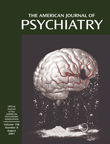Biperiden for Excessive Sweating From Clozapine
Mr. A was a 31-year-old white man with a 13-year history of schizophrenia. His distressing delusions and hallucinations were resistant to treatment with adequate trials of typical antipsychotics, risperidone, and olanzapine. Clozapine treatment produced a robust response but was accompanied by continuous generalized sweating. During sequential trials of chlorpromazine, clozapine, and olanzapine, the sweating occurred only during clozapine treatment.The inconvenience of changing saturated clothes and linens nightly led Mr. A to request clozapine discontinuation, despite his acknowledgment of frequent suicide attempts during treatment with all other antipsychotics. Dose reductions led to a worsening of his symptoms but did not diminish the sweating. Trials of propranolol, up to 240 mg/day, followed by clonidine, 1.2 mg/day, resulted in no significant reduction in the sweating. Biperiden, titrated to 6 mg/day, resulted in the prompt cessation of generalized sweating without exacerbation of other anticholinergic side effects. Sialorrhea was also eliminated with biperiden therapy.
References
Information & Authors
Information
Published In
History
Authors
Metrics & Citations
Metrics
Citations
Export Citations
If you have the appropriate software installed, you can download article citation data to the citation manager of your choice. Simply select your manager software from the list below and click Download.
For more information or tips please see 'Downloading to a citation manager' in the Help menu.
View Options
View options
PDF/EPUB
View PDF/EPUBGet Access
Login options
Already a subscriber? Access your subscription through your login credentials or your institution for full access to this article.
Personal login Institutional Login Open Athens loginNot a subscriber?
PsychiatryOnline subscription options offer access to the DSM-5-TR® library, books, journals, CME, and patient resources. This all-in-one virtual library provides psychiatrists and mental health professionals with key resources for diagnosis, treatment, research, and professional development.
Need more help? PsychiatryOnline Customer Service may be reached by emailing [email protected] or by calling 800-368-5777 (in the U.S.) or 703-907-7322 (outside the U.S.).

